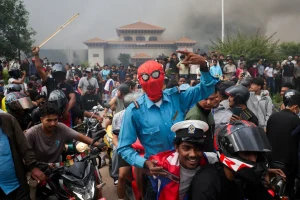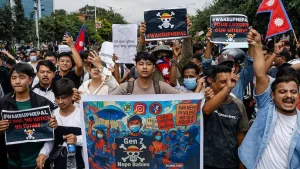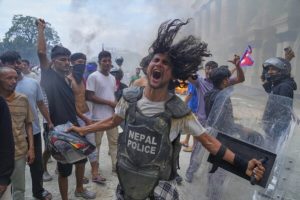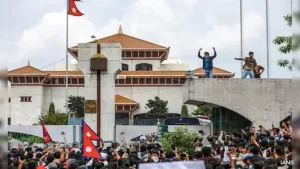The ongoing political crisis in Nepal has created a humanitarian emergency for Indian tourists, with over 100 visitors from Maharashtra currently stranded in the violence-hit Himalayan nation. As deadly Gen Z-led demonstrations continue to claim lives and disrupt normalcy, the Maharashtra government has launched comprehensive efforts to ensure the safe return of its citizens caught in this unprecedented turmoil.
 Deputy Chief Minister Ajit Pawar addressed the crisis on Wednesday, confirming that Nepal protests Maharashtra tourists has become a top priority for his administration. The government is coordinating closely with the Indian Embassy in Nepal through the Ministry of External Affairs and Maharashtra Sadan to provide immediate assistance to the stranded citizens.
Deputy Chief Minister Ajit Pawar addressed the crisis on Wednesday, confirming that Nepal protests Maharashtra tourists has become a top priority for his administration. The government is coordinating closely with the Indian Embassy in Nepal through the Ministry of External Affairs and Maharashtra Sadan to provide immediate assistance to the stranded citizens.
Also Read: Nepal protests Maharashtra tourists, and who were the organisers of these protests?
Other: Nepal Army Chief meets defiant Gen Z
“Our top priority is to bring every stranded tourist back home safely and to provide relief to their families,” Pawar stated, while urging tourists from Maharashtra not to panic. The Deputy Chief Minister emphasised that his government maintains constant communication with affected families and is extending all possible support during this challenging period.
The stranded Nepal protests Maharashtra tourists are primarily from five districts: Thane, Pune, Mumbai, Latur, and Kolhapur. According to official reports, the majority of these tourists are from Murbad in Thane district, highlighting the significant impact on this particular region.
The Nepal protests and the Maharashtra tourists crisis have affected diverse categories of travellers. Many of the stranded individuals were pilgrims returning from the sacred Kailash Mansarovar Yatra, a spiritual journey that holds immense significance for Hindu devotees. Additionally, business travellers and regular tourists found themselves unexpectedly trapped when the situation escalated rapidly.


The human cost of these Nepal protests Maharashtra tourists being stranded, extends beyond mere inconvenience. Families across Maharashtra have been left anxious and worried about their loved ones’ safety, creating emotional distress that compounds the physical challenges faced by the tourists themselves.
The Gen Z protests began as youth demonstrations but quickly escalated into violent confrontations, with police using lethal force that killed at least 19 people and injured over 300. Current reports suggest that at least 19 people have been killed in the protests, and more than 200 others were admitted to the hospital due to injuries.
The violence intensified dramatically, with protesters smashing windows, looting businesses, and setting government buildings on fire, forcing the country’s main international airport to shut for 24 hours. This closure directly impacted the Nepal of Maharashtra tourists from Nepal in Maharashtra, trapping travellers at the airport without clear evacuation options.
The political ramifications proved equally severe, culminating in the resignation of Prime Minister K P Sharma Oli on Tuesday. Airport operations were further complicated when protesters went to Tribhuvan International Airport to block political leaders from fleeing, leading to the facility being closed and occupied by the Nepali Army.
The Indian Embassy in Kathmandu played a crucial role in addressing the Nepal protests and the Maharashtra tourist crisis. Embassy officials arrived at the airport early Wednesday morning to provide direct assistance to stranded travellers. Their intervention proved vital in organising temporary accommodation and ensuring necessities for the affected tourists.


The Embassy’s coordinated response demonstrates the effectiveness of diplomatic channels in crisis management, particularly for situations affecting Nepal protests Maharashtra tourists and other Indian nationals caught in similar circumstances.
Positive developments emerged as some tourists began their journey home. Pawar confirmed that tourists from Beed district who had travelled to Nepal were successfully returning by road in private vehicles and had reached Gorakhpur in Uttar Pradesh. This development provides hope for other Nepal protests, and Maharashtra tourists awaiting evacuation.
The Nepal Civil Aviation Authority announced a phased resumption of flights from Kathmandu following a comprehensive security audit. “We hereby inform that the flights suspended due to adverse circumstances would now be lifted,” the authority stated, requesting passengers to contact their respective airlines for updated flight information.
In response to the deteriorating situation affecting Nepal protests Maharashtra tourists, the Ministry of External Affairs issued a comprehensive travel advisory on Wednesday. The advisory strongly recommends that Indian citizens defer their travel to Nepal until the political situation stabilises completely.
“In view of the developing situation in Nepal, Indian citizens are advised to defer their travel until the situation has stabilised. Indian citizens presently in Nepal are advised to take shelter in their current places of residence, avoid going out onto the streets, and exercise all due caution,” the advisory stated.


The Nepal protests and the Maharashtra tourist crisis highlight the vulnerability of international travellers during political upheavals. The situation underscores the importance of robust emergency protocols and diplomatic coordination between neighbouring countries during times of crisis.
Deputy Chief Minister Pawar’s assurance that “all tourists are safe” provides some comfort, but the incident raises important questions about travel insurance, emergency communication systems, and pre-travel briefings for tourists visiting politically sensitive regions.
The Maharashtra government’s handling of the Nepal protests and the situation of Maharashtra tourists demonstrates effective crisis management, combining diplomatic engagement, family communication, and coordinated evacuation efforts. As the situation continues to evolve, authorities remain committed to ensuring that no citizen remains stranded and that all return home safely.
The resolution of this crisis will likely influence future travel advisories and emergency preparedness protocols for Nepal protests Maharashtra, tourists and other interstate travel situations involving political instability.

